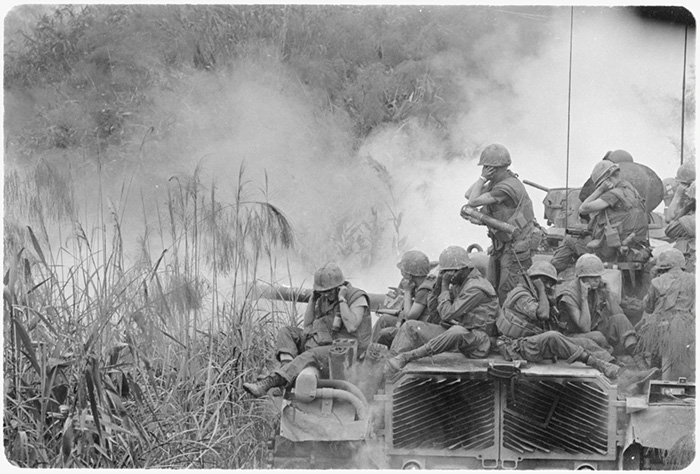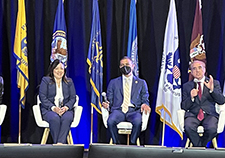Office of Research & Development |
 |


A new data analysis found that Veterans who served in Vietnam, Cambodia, or Laos during the Vietnam War have a higher prevalence of mental health issues, particularly PTSD, compared with other Vietnam-era Veterans and non-Veterans. Here, Marines ride atop a tank during a road sweep near Phu Bai in central Vietnam. (Photo: National Archives)
March 17, 2022
By Nancy Volkers
For VA Research Communications
"Although almost 50 years have passed since the official war's end in 1975, Vietnam theater Veterans are still reporting poor mental health."
Veterans who served in Vietnam, Cambodia, or Laos during the Vietnam War have a higher prevalence of mental health issues, particularly PTSD, compared with both other Vietnam-era Veterans and non-Veterans, according to an analysis of data from the Vietnam Era Health Retrospective Observational Study (VE-HEROeS).

VA opens new research center to seek novel arthritis treatments

VA Researcher Named One of U.S.’ Top Female Scientists

Under Secretary of Health, panel of experts discusses PACT Act impacts for Veterans

Million Veteran Program director speaks at international forum
The report appeared online in The Journal of Traumatic Stress in March 2022.
“Although almost 50 years have passed since the official war’s end in 1975, Vietnam theater Veterans are still reporting poor mental health,” said Dr. Victoria Davey, the study’s senior author. Davey is the principal investigator of VE-HEROeS and an associate chief research and development officer for VA.
VE-HEROeS is the first nationwide survey of both the physical and mental health of Vietnam War Veterans in more than 30 years. It sought survey data from more than 45,000 Vietnam-era Veterans, as well as 11,000 matched controls. Data collection was completed in 2016 and 2017; nearly 19,000 Veterans responded. Multiple analyses are underway based on the data.
VE-HEROes collected survey data from three groups:
Compared with non-theater Veterans, Vietnam-theater Veterans had four times the risk of PTSD, nearly double the risk for depression, and more than two times the risk of psychological distress. Compared with non-Veterans, they had more than nine times the risk of PTSD, more than double the risk for depression, and nearly six times the risk of psychological distress.
Overall in the United States, about 2% to 3% of adults ages 65 and older suffer from psychological distress (NHIS 1997-2004). In VE-HEROeS, the percentages were 1.8% among non-Veterans, 4.5% in non-theater Veterans, and 10.4% in Vietnam-theater Veterans.
Among Vietnam-theater Veterans, Blacks and Hispanics reported greater PTSD, depression, and psychological distress than did whites. This was particularly true for Hispanic theater Veterans, who had significantly higher risk for PTSD and depression, compared with white Vietnam theater Veterans. Black and Hispanic non-theater Veterans also had elevated risks for PTSD, compared with white non-theater Veterans.
Vietnam-theater Veterans were more likely than non-theater Veterans to have served in the Army (54.4% vs 43.4%); to have served between 1965 and 1970, during the height of the Vietnam War (73.1% vs 59.9%); and to have been drafted (25.5% vs 19.9%).
Physical health and traumatic events were strongly linked with mental health status in this study. Other studies have shown that Veterans exposed to high war-zone stress have poorer physical health, and that traumatic events are associated with poorer mental health.
VE-HEROeS survey data show that an estimated 62.9% of Vietnam-theater Veterans either experienced combat or were in a non-combat position in which they felt afraid for their lives. This was reported much less often by non-theater Veterans and non-Veterans (7.1% and 1.3%, respectively).
“These results may underestimate the mental health burden of Vietnam-theater Veterans, because those at greatest risk for poor mental health may have already died, or may be homeless or incarcerated,” noted Davey.
“The Vietnam War continues to have negative effects on Veterans’ mental health, particularly for those who served in the Vietnam theater,” she added. “This is the case even 45 years after the war ended. The availability of mental health services will continue to benefit these Veterans.”
VA Research Currents archives || Sign up for VA Research updates